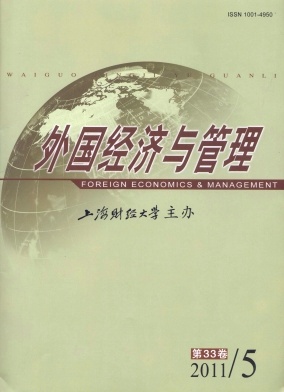国外制度创业研究前沿探析与未来展望
外国经济与管理 2011 年 第 33 卷第 05 期, 页码:1 - 8
摘要
参考文献
摘要
制度创业理论整合了组织社会学的制度理论和管理学的创业理论,旨在解释制度从何而来这一重要问题。这方面的研究在国外已经历了20多年的发展,但在国内尚处于起步阶段。本文因循制度创业研究的逻辑脉络分别从制度创业动因、制度创业主体、制度创业过程及制度创业效果四个方面进行系统的述评,然后探索性地构建制度创业研究整合分析框架,并提出了若干旨在推进我国制度创业研究发展的建议。
[1]Maguire,S,Hardy,C,and Lawrence,T B.Institutional entrepreneurship in emerging fields:HI V/AIDS treat ment advocacy inCanada[J].Academy of Management Journal,2004,47(5):657-679.
[2]Garud,R,Hardy,C,and Maguire,S.Institutional entrepreneurship as embedded agency:Anintroduction to the special issue[J].Organization Studies,2007,28(7):957-969.
[3]Khan,F R,Munir,K A,and Will mott,H.Adark of institutional entrepreneurship:Soccer balls,childlabour and postcolonial i m-poverishment[J].Organization Studies,2007,28(7):1 055-1 077.
[4]Mair,J,and Marti,I.Entrepreneurship in and around institutional void:Acase study from Bangladesh[J].Journal of BusinessVenturing,2009,24(5):419-435.
[5]Hiatt,S R,Sine,WD,and Tolbert,P S.From Pabst to Pepsi:The deinstitutionalization of social practices and the creation of en-trepreneurial opportunities[J].Administrative Science Quarterly,2009,54(4):635-667.
[6]Fligstein,N.Social skill andinstitutional theory[J].American behavioral scientist,1997,40(4):397-405.
[7]Beckert,J.Agency,entrepreneurs,andinstitutional change:The role of strategic choice andinstitutionalized practices[J].Organi-zation Studies,1999,20(5):777-799.
[8]Dorado,S.Institutional entrepreneurship,partaking,and convening[J].Organization Studies,2005,26(3):385-414.
[9]Seo,M G,and Creed,WE D.Institutional contradictions,praxis,and institutional change:A dialectical perspective[J].Academyof Management Review,2002,27(2):222-247.
[10]Di Maggio,PJ.Interest and agencyininstitutional theory[A].in L GZucker(Ed.).Institutional patterns and organizations:Cul-ture and environment[C].Cambridge,MA:Ballinger,1988:3-21.
[11]Greenwood,R,and Suddaby,R.Institutional entrepreneurship in mature fields:The big five accounting firms[J].Academy ofManagement Journal,2006,49(1):27-48.
[12]张铭,胡祖光.组织分析中的制度创业研究述评[J].外国经济与管理,2010,32(2):16-23.
[13]Misangyi,V F,Weaver,G W,and El ms,H.Ending corruption:The interplay among institutional logics,resources,and institu-tional entrepreneurs[J].Academy of Management Review,2008,33(3):750-770.
[14]Garud,R,Jain,S,and Kumaraswamy,A.Institutional entrepreneurship in the sponsorship of common technological standards:The case of Sun Microsystems and Java[J].Academy of Management Journal,2002,45(1):196-214.
[15]Battilana,J.Agency andinstitutions:The enabling role of individuals’social position[J].Organization,2006,13(5):653-676.
[16]Perkmann,M,and Spicer,A.Healing the scars of history:Projects,skills and field strategies in institutional entrepreneurship[J].Organization Studies,2007,28(7):1 101-1 122.
[17]Mutch,A.Reflexivity and the institutional entrepreneur:A historical exploration[J].Organization Studies,2007,28(7):1 123-1 140.
[18]Fligstein,N.Social skill and the theory of fields[J].Sociological Theory,2001,19(2):105-125.
[19]Greenwood,R,Suddaby,R,and Hinings,C R.Theorizing change:The role of professional associations in the transformation ofinstitutionalized fields[J].Academy of Management Journal,2002,45(1):58-80.
[2]Garud,R,Hardy,C,and Maguire,S.Institutional entrepreneurship as embedded agency:Anintroduction to the special issue[J].Organization Studies,2007,28(7):957-969.
[3]Khan,F R,Munir,K A,and Will mott,H.Adark of institutional entrepreneurship:Soccer balls,childlabour and postcolonial i m-poverishment[J].Organization Studies,2007,28(7):1 055-1 077.
[4]Mair,J,and Marti,I.Entrepreneurship in and around institutional void:Acase study from Bangladesh[J].Journal of BusinessVenturing,2009,24(5):419-435.
[5]Hiatt,S R,Sine,WD,and Tolbert,P S.From Pabst to Pepsi:The deinstitutionalization of social practices and the creation of en-trepreneurial opportunities[J].Administrative Science Quarterly,2009,54(4):635-667.
[6]Fligstein,N.Social skill andinstitutional theory[J].American behavioral scientist,1997,40(4):397-405.
[7]Beckert,J.Agency,entrepreneurs,andinstitutional change:The role of strategic choice andinstitutionalized practices[J].Organi-zation Studies,1999,20(5):777-799.
[8]Dorado,S.Institutional entrepreneurship,partaking,and convening[J].Organization Studies,2005,26(3):385-414.
[9]Seo,M G,and Creed,WE D.Institutional contradictions,praxis,and institutional change:A dialectical perspective[J].Academyof Management Review,2002,27(2):222-247.
[10]Di Maggio,PJ.Interest and agencyininstitutional theory[A].in L GZucker(Ed.).Institutional patterns and organizations:Cul-ture and environment[C].Cambridge,MA:Ballinger,1988:3-21.
[11]Greenwood,R,and Suddaby,R.Institutional entrepreneurship in mature fields:The big five accounting firms[J].Academy ofManagement Journal,2006,49(1):27-48.
[12]张铭,胡祖光.组织分析中的制度创业研究述评[J].外国经济与管理,2010,32(2):16-23.
[13]Misangyi,V F,Weaver,G W,and El ms,H.Ending corruption:The interplay among institutional logics,resources,and institu-tional entrepreneurs[J].Academy of Management Review,2008,33(3):750-770.
[14]Garud,R,Jain,S,and Kumaraswamy,A.Institutional entrepreneurship in the sponsorship of common technological standards:The case of Sun Microsystems and Java[J].Academy of Management Journal,2002,45(1):196-214.
[15]Battilana,J.Agency andinstitutions:The enabling role of individuals’social position[J].Organization,2006,13(5):653-676.
[16]Perkmann,M,and Spicer,A.Healing the scars of history:Projects,skills and field strategies in institutional entrepreneurship[J].Organization Studies,2007,28(7):1 101-1 122.
[17]Mutch,A.Reflexivity and the institutional entrepreneur:A historical exploration[J].Organization Studies,2007,28(7):1 123-1 140.
[18]Fligstein,N.Social skill and the theory of fields[J].Sociological Theory,2001,19(2):105-125.
[19]Greenwood,R,Suddaby,R,and Hinings,C R.Theorizing change:The role of professional associations in the transformation ofinstitutionalized fields[J].Academy of Management Journal,2002,45(1):58-80.
引用本文
项国鹏, 胡玉和, 迟考勋. 国外制度创业研究前沿探析与未来展望[J]. 外国经济与管理, 2011, 33(5): 1–8.
导出参考文献,格式为:





 8098
8098  392
392

